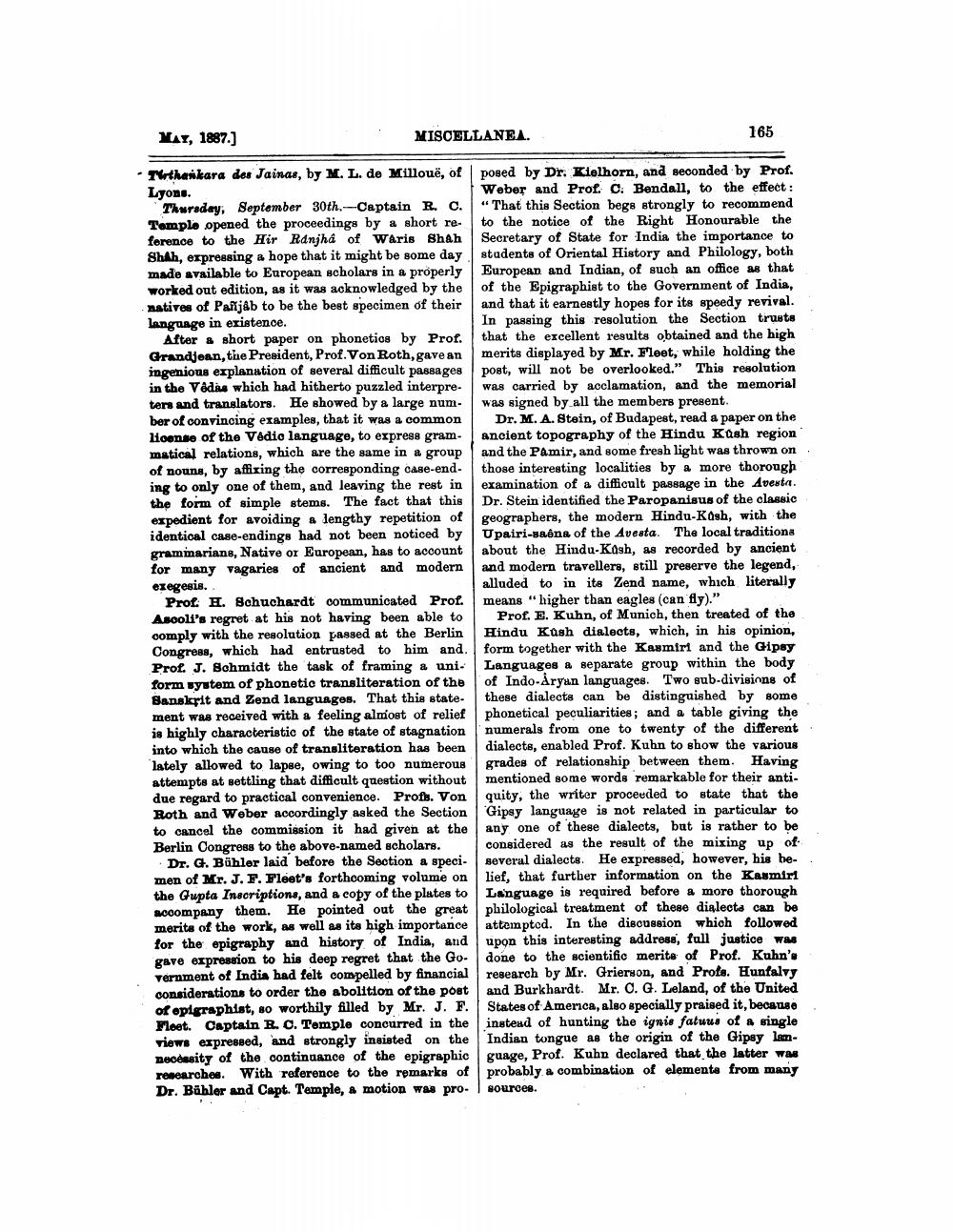________________
MAY, 1887.)
MISCELLANEA.
165
- Tyrtharikara des Jainas, by M. L. de Millouë, of posed by Dr. Kielhorn, and seconded by Prof. Lyons.
Weber and Prof. C. Bendall, to the effect: Thursday, September 30th.-Captain R. c. “That this Section bege strongly to recommend Templo opened the proceedings by a short re- to the notice of the Right Honourable the ference to the Hir Ranjha of Waris Shah Secretary of State for India the importance to ShAh, expressing a hope that it might be some day students of Oriental History and Philology, both made available to European scholars in a properly European and Indian, of such an office as that worked out edition, as it was acknowledged by the of the Epigraphist to the Government of India, natives of Pasijáb to be the best specimen of their and that it earnestly hopes for its speedy revival. language in existence.
In passing this resolution the Section trusts After a short paper on phonetics by Prof. that the excellent results obtained and the high Grandjoan, the President, Prof. Von Roth, gave an merits displayed by Mr. Fleet, while holding the ingenions explanation of several difficult passages post, will not be overlooked." This resolution in the Vodie which had hitherto puzzled interpre- was carried by acclamation, and the memorial ters and translators. He showed by a large num. was signed by all the members present. ber of convincing examples, that it was a common Dr. M. A. Stein, of Budapest, read a paper on the Hoone of the Vedic language, to express gram. ancient topography of the Hindu Kush region matical relations, which are the same in a group and the Pamir, and some fresh light was thrown on of nouns, by affixing the corresponding Case-end. those interesting localities by a more thorough ing to only one of them, and leaving the rest in examination of a difficult passage in the Avesta. the form of simple stems. The fact that this Dr. Stein identified the Paropanisus of the classic expedient for avoiding a lengthy repetition of geographers, the modern Hindu-Kash, with the identical case-endings had not been noticed by Upairi-sabna of the Avesta. The local traditions graminarians, Native or European, has to account about the Hindu-Kash, as recorded by ancient for many vagaries of ancient and modern and modern travellers, still preserve the legend, exegesis.
alluded to in its Zend name, which literally Prof. H. Schuchardt communicated Prof. means "higher than eagles (can fly)." Asool's regret at his not having been able to Prof. E. Kuhn, of Munich, then treated of the oomply with the resolution passed at the Berlin | Hindu Kush dialects, which, in his opinion, Congress, which had entrusted to him and form together with the Kasmiri and the Gipsy Prof. J. Schmidt the task of framing & uni. Languages a separate group within the body form system of phonetic transliteration of the of Indo-Aryan languages. Two sub-divisions of Sanskrit and Zend languages. That this state. these dialects can be distinguished by some ment was received with a feeling almost of relief phonetical peculiarities; and a table giving the is highly characteristic of the state of stagnation numerals from one to twenty of the different into which the cause of transliteration has been dialects, enabled Prof. Kuhn to show the various lately allowed to lapse, owing to too numerous grades of relationship between them. Having attempts at settling that difficult question without mentioned some words remarkable for their antidue regard to practical convenience. Prof. Von quity, the writer proceeded to state that the Roth and Weber accordingly asked the Section "Gipsy language is not related in particular to to cancel the commission it had given at the any one of these dialects, but is rather to be Berlin Congress to the above-named scholars. considered as the result of the mixing up of
Dr. G. Bühler laid before the Section a speci. several dialects. He expressed, however, his bemen of Mr. J. F. Fleet's forthcoming volume on lief, that further information on the Kasmir the Gupta Inscriptions, and a copy of the plates to Language is required before a more thorough accompany them. He pointed out the great philological treatment of these dialects can be merits of the work, as well as its high importance attempted. In the discussion which followed for the epigraphy and history of India, and upon this interesting address, full justice was gave expression to his deep regret that the Go- done to the scientific merite of Prof. Kuhn's vernment of India had felt compelled by financial research by Mr. Grierson, and Prots. Hunfalvy considerations to order the abolition of the post and Burkhardt. Mr. C. G. Leland, of the United of epigraphist, so worthily filled by Mr. J. F. States of America, also specially praised it, because Fleet. Captain R. O. Temple concurred in the instead of hunting the ignis fatuus of a single viows expressed, and strongly insisted on the Indian tongue as the origin of the Gipsy lemnecessity of the continuance of the epigraphic guage, Prof. Kuhn declared that the latter was researches. With reference to the remarks of probably a combination of elements from many Dr. Böhler and Capt. Temple, a motion was pro- sources.




